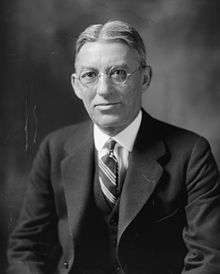Lincoln Clark Andrews
| Lincoln Clark Andrews | |
|---|---|
 | |
| Born | November 21, 1867 |
| Died | November 23, 1950 (aged 83) |
| Education |
Cornell University, United States Military Academy |
| Known for |
Brigadier general in the United States Army during World War I, Assistant Secretary of the Treasury |
| Title | Assistant Secretary of the Treasury |
| Term | April 1, 1925 to August 1, 1927 |
| Predecessor | Roy Asa Haynes |
| Spouse(s) | Charlotte Graves |
| Children | John G. Andrews |
Lincoln Clark Andrews (1867–1950) was a brigadier general in the United States Army during World War I and Assistant Secretary of the Treasury starting in 1925. As Assistant Secretary of the Treasury, he was in charge of Prohibition enforcement. Time magazine called his forces the Prohibition Army.
Early life
He was born on November 21, 1867 to Charles T. Andrews and Mary Clark Andrews.[1][2]:11 He attended Cornell University from 1888 to 1889.[1]
Military career
He attended the United States Military Academy, graduating number thirteen of fifty-one in 1893.[1][2]:11
As a 2nd lieutenant, he commanded Troop G of the 3rd Cavalry.[1][2]:11[3]
With Troop G, he served during the Pullman Strike riots in Chicago in 1894.[3]
During the Spanish–American War, he served as an aide to Gen. Edwin Vose Sumner, the Commanding General of the cavalry division.[2]:11
He was briefly an instructor of physics at the United States Military Academy.[2]:11
From 1899 to 1903, he served in the Philippines as governor of the island of Leyte and participated in the campaign against the Moros.[2]:11
He returned to the United States Military Academy in 1903 to teach cavalry tactics.[2]:11 From 1911 to 1915, he taught cavalry tactics for the New York National Guard and also at the training camp near Plattsburgh, New York.[2]:11
Between 1916 and 1917, he trained the Philippine National Guard Division.[2]:11
He was promoted to lieutenant colonel on June 28, 1917.[1]
He served as a brigadier general of the 172nd Infantry Brigade, 86th Division at Camp Grant, Illinois. He took this brigade to France in August 1918.[1]
After the armistice, he served as deputy provost marshal general at general headquarters until it was disbanded.[1][2]:11
He retired at his own request after 30 years of service on September 30, 1919.[1] His rank of brigadier general was restored by act on Congress in June 1930.[2]:11
His publications
- Basic Course for Cavalry, 1914
- Fundamentals of Military Service, 1916
- Leadership and Military Training, 1918
- Man Power, 1921
- Military Man Power, 1921
Awards
- Distinguished Service Medal [3][4]
- Silver Citation Star[4]
- Legion of Honour[3]
- Order of the Crown of Italy[3]
Civilian career
Andrews held the office Assistant Secretary of the Treasury after Roy Asa Haynes. He reorganized the bureau in 1925, resulting in the layoffs of numerous agents, including Izzy Einstein and Moe Smith in New York, who were nationally the most successful and famous team.[5][6] Andrews saw Prohibition enforcement as a technical challenge and was not an ideological adherent to the dry movement.[7] Andrews served until August 1, 1927.[1]
From Nov. 1, 1927 to June 1928, he was the president of Guardian Investment Trust in Hartford, Connecticut.[1]
In June 1928, he became president of the Rubber Institute.[2]:11
Personal life
He married Charlotte Graves on October 5, 1899. They had one son: John G. Andrews.[2]:11
He lived in Grand Isle, Vermont.[2]:11
Death and legacy
He died on November 23, 1950[1] in Northampton, Massachusetts.[2]:11 He is buried in Logan Cemetery, Hector, New York.[8]
References
| Wikimedia Commons has media related to Lincoln Andrews. |
- 1 2 3 4 5 6 7 8 9 10 11 Who Was Who in American History – the Military. Chicago: Marquis Who's Who. 1975. p. 13. ISBN 0837932017.
- 1 2 3 4 5 6 7 8 9 10 11 12 13 14 15 Davis, Henry Blaine. Generals in Khaki. Raleigh, NC: Pentland Press, 1998. ISBN 1571970886 OCLC 231779136
- 1 2 3 4 5 "Memorial".
- 1 2 "Valor awards for Lincoln Clark Andrews".
- ↑ "Izzy and Moe", Time, 23 November 1925, accessed 11 April 2011
- ↑ "Aut Vox, aut Vis". Time magazine. July 20, 1925. Retrieved 2009-08-18.
For four years, the champion of the Prohibition Army has been a crusader Commissioner Roy Asa Haynes. But now an efficiency expert has arisen to fight with him for leadership. Lincoln C. Andrews, new Assistant Secretary of the Treasury in charge of Prohibition enforcement, looked upon the work of the crusader and found it ineffective. Mr. Andrews is a General (a title he acquired in military service) and promptly he set out to reorganize the Prohibition Army.
- ↑ Metcalfe, Philip (2007). Whispering wires : the tragic tale of an American bootlegger. Portland, Oregon: Inkwater Press. p. 136. ISBN 9781592992522.
- ↑ "Gen Lincoln Clark Andrews (1867–1950) – Find A Grave Memorial".
- Bibliography
- Davis, Henry Blaine. Generals in Khaki. Raleigh, NC: Pentland Press, 1998. ISBN 1571970886 OCLC 231779136
- Who Was Who in American History – the Military. Chicago: Marquis Who's Who. 1975. ISBN 0837932017.